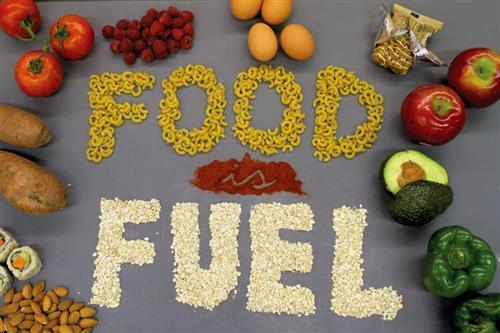Nutrition

- In order to approach peak performance in athletics, student-athletes, parents, and coaches need accurate information on how to properly fuel and nourish the body. The following information is standard guidelines to help promote healthy eating habits for athletes. The athlete has to monitor food intake to replenish excessive energy sources needed for rigorous and sustained practices/competitions.
- Eat more complex carbohydrates. By ingesting carbohydrates, athletes maximize glycogen storage. Glycogen is the primary source of energy for muscles. Recommended sources of carbohydrates are grains, cereals, breads, potatoes, pasta, vegetables, and fruits. As an added bonus, most carbohydrate sources are also high in vitamins and minerals.
- Eat moderate amounts of protein. Athletes must understand that eating excess protein is not beneficial. While athletes have a slightly increased protein requirement, the normal athletic diet is composed of more than adequate amounts of protein. Eat more complex carbohydrates, not more protein!
- Eat less high-fat foods. Foods high in fats include fried foods, cookies, cakes, luncheon meats and whole milk dairy products. This does not mean avoid these foods totally. However, we must learn to choose low fat versions such as skim milk, lean beef, fish and chicken (minus the skin), and low fat snacks, such as pretzels.
- Stay hydrated especially in hot weather. Studies clearly show that performance suffers in a dehydrated athlete. Drink before, during and after exercise. Plain cold water is usually the best. However, sports drinks may provide an edge if you exercise continuously over one hour. Thirst is not a good measure of when to drink fluids. A thirsty athlete is already in early stages of dehydration.
- Maintain a healthy body composition. Avoid quick weight loss. Within reasonable guidelines, a leaner athlete is a more efficient athlete. A normal range of percent body fat for males is 7-18%, while a healthy range for females is 15-25%. Your body fat is determined by heredity, and of course, diet and exercise.
- Replace carbohydrates used for energy during training and competition. In order to refuel your body to prepare for the next practice or game, carbohydrate rich foods need to be ingested soon after exercise. Eating 200-400 carbohydrate calories within 1-2 hours of exercise is best.
- Eat an appropriate pre-competition meal three to four hours before practicing or playing a game, athletes need to ‘fuel’ their bodies with a high carbohydrate, medium sized meal composed of familiar food. However, within an hour of exercise, always avoid foods high in sugar such as candy bars.
- Don’t be tempted by nutritional supplements or other “performance-enhancers”.
Athletes have to monitor their food consumption. Nutrition is an important aspect for leading a healthy lifestyle for everyone. We, as a society, are currently experiencing obesity and overeating in record proportions. We have to address our eating habits and develop a plan to ensure a healthy lifestyle for ourselves and guide our children to understand and prioritize these concepts. Parents should familiarize themselves with a sound dietary/nutritional program for themselves and for their athlete.
